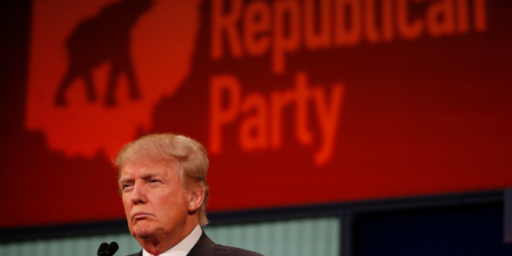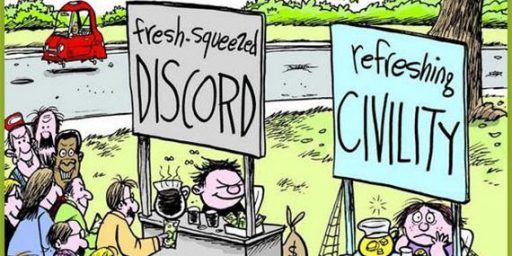Balancing Civility and Honesty in Online Debate
Is there a trade-off in being polite?
Andrew Exum has an interesting interview with Daveed Gartenstein-Ross, author of the new book Bin Laden’s Legacy: Why We’re Still Losing the War on Terror. In addition to useful insights on the subject at hand, they branch off into a sidebar about the nature of online debate:
While we’re on personal subjects, it’s no secret that the blogosphere and Twitter encourage the worst snark, sarcasm and ugliness from people. You and I have talked about our mutual struggles to remain civil and polite while engaging with others, but unlike me, your reputation is unimpeachable: you always respond to your critics and other readers with politeness and courtesy. Why does civility matter in our line of work? And how do you discipline your own speech in the public sphere? Is there a trade-off? Do we lose something in terms of honesty by being polite?
I’ve come to see civility as important for a variety of reasons, but honestly, practical reasons loom rather large. First of all, it’s generally hard to win a name-calling contest. If I call someone an America-hating pinko, they can fire back that I’m a right-wing tool of the military industrial complex. Those two insults seem essentially to cancel each other out: why give someone an area that can end up a draw if I believe that I can prove all of my other arguments to be correct? Second, I find that if I’m civil, I can actually (sometimes) persuade people I’m arguing against that they’re wrong about an issue. In contrast, if I begin a debate by insulting someone, it only further entrenches him in his initial position, thus making it more difficult to talk sense into him.
I’ve found the balance I strike in my own small corner of the public sphere to be rather intuitive and comfortable. I’m unyielding when making arguments, but generally try not to belittle the people I’m engaging. If they really are so dumb that I feel like I can’t help but insult them, it’s almost always easier to disengage than to tell them how I really feel.
I don’t think there’s a trade-off involved in being polite. Being polite isn’t the same as being a pushover, nor is it the same as false collegiality that needlessly avoids confrontation. Indeed, I think that kind of fake collegiality should be avoided: the review I published this year of Robert Pape and James Feldman’s Cutting the Fuse is probably one of the harshest critiques a graduate student has produced of a work of that stature. But again, it eviscerates their argument without really personalizing the matter.
Finally, I think it’s much more important to be polite or collegial to people who are just breaking into the public sphere and are feeling their way around than to those who are well established. For those who are young and realize they have a lot to learn, it’s possible to help them in that process. People who are better established are usually more hardened in their views. For those who have become tenured professors or have been part of the National Security Staff, if I don’t like what they stand for now, then I probably never will.
On Twitter, especially, I’m quite a bit snarkier than Daveed but we share the same overall philosophy about the nature of the enterprise. He’s a former national champion debater, which explains his coming up with a strategic calculation about the tit-for-tat that had never really occurred to me. But he’s absolutely right that going negative assures that you won’t persuade anyone who didn’t already agree with you.
We also agree that one can both challenge weak arguments and remain civil and that there’s a hierarchy of harshness, with those who are more senior and powerful deserving less deference.
Perhaps the hardest bit of Daveed’s advice to take is to avoid engaging stupid people. It’s fairly easy as a blogger–I’ve always thought posts of the nature “stupid, unimportant person on the other side of the aisle said something stupid so let me use that to make some larger point about that side” among the weakest tropes of punditry. But it’s harder to avoid engaging commenters and tweeters who are dense, wildly uninformed, and unwilling to accept evidence that goes against their preconceptions.







Palintropy – the tendency in any political discourse for civility and rational discussion to decline and degenerate.
I actually think it’s important to be dismissive of truly bad positions. Many of these “dense, wildly uninformed, and unwilling to accept evidence” memes live for years on false reasonableness, and an imitation of argument.
@john personna:
The problem is that more and more research shows going out of your way to dismiss argument X weirdly ends up reenforcing the belief in X, because people only remember the argument over X, not any of the points made by either side.
To give an example, into three months, most people aren’t going to remember any of the information about how safe HPV vaccine is; they’re just going to remember that there was a big argument about the safety of the HPV vaccine during the Republican primary. Which ends up helping nutbars like Bachmann.
So many of us see an honesty continuum that ranges from pushover to polite to rudeness to evisceration. This points to, but does not get to the heart of the matter.
Consider placing honesty on a different continuum. At one end is compassion, at the other clarity. Honesty without compassion(clarity only) is cruelty. Compassion without honesty(compassion only) is foolishness.
Try evaluating your replies by that criteria.
“civility” does not preclude sharp even caustic comment.
In fact the most damning aspect of “uncivil” dialogue is its impotence.
@Stormy Dragon:
I did say “dismiss.” That is not the same as going out of your way, collecting evidence again, and again, etc.
So basically I’m suggesting a course consistent with that research.
Bile and snark are all some people have to offer.
The problem with Daveed Gartenstein-Ross’ approach is…how exactly does it deal with someone like Rush Limbaugh, Glenn Beck or Sean Hannity?
Mike
@MBunge:
You can’t really deal with people like Rush because they make their money off of inciting people. It’ s not logic or civility to which they appeal, but blind hatred. How do you answer a non-argument? Much the same is true with a lot of blog prosters who seem more intent on stirring the pot than in actual discussion or give and take. Rational, civil argument isn’t likely to win them over because their minds are closed to other points of view.
Sure you can.
As you pointed out, the fringe right shouters and their cult members try to incite people.
Simply be polite, never let them get you upset, politely counter their lies with facts, and they will spin out of control.
Fixed that for you.
@ponce: That doesn’t work if the facts don’t matter. Look at the Sarah Palin phenomenon. She was hardly the reform-minded small government maverick that she was portrayed as being, and she certainly has her own crony capitalism issues. And yet she was embraced by the Republican Party desperate for a rock star of its own. It has taken 3 years for the facts to settle in and for the gloss to wear off, but the damage to our society has been done.
What damage has Sarah Palin done to America?
The facts are she is very popular among a small but significant segment of America, and she’s gotten rich selling them stuff.
Remember, a majority of Americans voted against Sarah Palin in her only national election.
@ponce: Maybe she is more symptomatic of a deeper problem, but what damage has she done? She has lowered the bar for competence in electoral politics. She has made it openly acceptable to avoid accountability to the public, pushing what she wants to say and not answering any actual questions. Palin’s conduct is the blueprint for others to skate by on sloganeering instead of having substantive policy. It may not always be successful (see Christine O’Donnell and Sharron Angle), but it is far more common now.
One of the problem with trying to have civility is people want others to be civil while seldom looking inward. A person often doesn’t think he\she is being uncivil when they are doing the name calling.
Look at the name calling in this thread calling for civility and poster on this thread are probably on their best behavior.
“nutbars like Bachmann”
“the fringe right shouters and their cult members”
Accusing people of being guided by “blind hatred”
Ponce called someone else a “liar” in another thread while mentioning this thread.
Remember when you accuse or name call a whole group whether it is Jews, Blacks, Republicans, Tea Party, etc. You are doing it to all its members.
And please don’t give me the lame argument of “I’m not talking about the whole group but only the ones that fit my insults and if you are insulted then you must fit my insulted” .When you insult a group for example if someone says those “tightwad Jews”, “thieving blacks” or “wing nut Tea Party members”, it is taken to reflect on every member of that group not just those in the group that happen to fit the bill.
Palin’s style is classic populism, which predates America itself.
70% of Americans now say they would not vote for her if she ran for president.
Like most flash in the pan politicians, she was a creature of the moment.
@Wayne: True. And the derogatory remark making is pervasive. Bachmann was called a nutbar in the title of the post just preceeding this one.
@Wayne: @rodney dill:
But wasn’t that about something we should be properly dismissive of? Old disproved fears surrounding vaccinations?
I agree with Daveed. When someone is obviously stupid or not arguing in good faith, I just don’t engage, most of the time. It is difficult sometimes to not shoot the sitting duck.
Steve
@john personna: Its both uncivil and dismissive (and in my judgement calling someone a name like ‘nutbar’ errors on being more uncivil than dismissive). I made no judgement on fears surrounding vaccinations. If you want to be dismissive, go ahead. Do it with out being uncivil.
Just as an example, Ponce made the statement on Palin
To me that is dismissive and acceptably civil, While there is some subjectivity in making that judgement, I see uncivility as being the overriding factor in some of the derogatory comments. (I am certainly guilty myself from time to time.) I coined the word Palintropy (a pun on one meaning of entropy) that captures my thoughts on comments at OTB of late.
@john personna:
@rodney dill:
(commenting on my own comment)
…to be fair calling someone a nutbar isn’t as uncivil as a lot of the other things said about commentors, politicians, parties, here either.
@rodney dill:
I don’t think OTB should be “nutbar” 7×24, but it doesn’t bother me that the occasional is thrown in the context of fringe, irrational, movements.
And as uncivil as it may be at times, if Mrs. Palin is a good woman out of here depth, guarding her from deeper waters might be fighting the good fight.
@john personna: Did you mean nutbar free? From my preceding comment I would agree if nutbar was the worst of it.
So there, neener neener
😉
(update: @john personna … I re-read your comment and understood it without the addition of the word ‘free’. My error in reading it the first time)
@rodney dill: My take on the “nutbar” label is somewhat different. I wouldn’t have used it, because I’m already seen as wildly unsympathetic to Bachmann so it would just serve to weaken my persuasive power. Dodd, on the other hand, is easily the most pro-Tea Party of our regular posters. For him to use it amounts to a “National Review casting out the Birchers” or “Sister Soulja” moment.
@James Joyner: Yeah, its not the worst thing to say, but not my choice either as a starting point in an environment where things demonstrably digress….